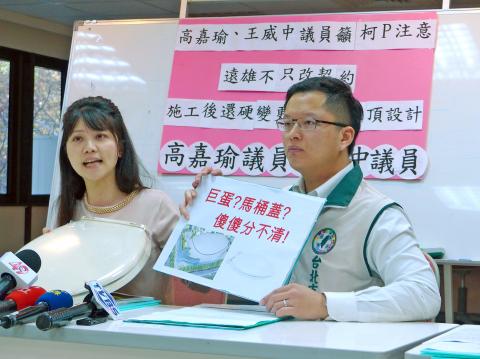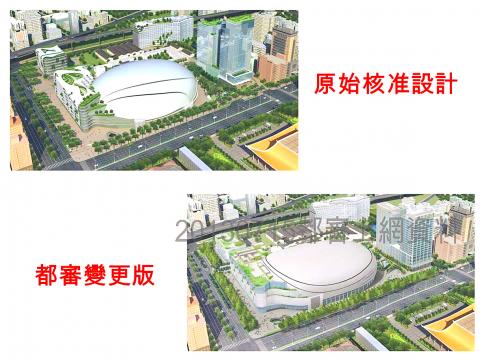Contract negotiations between the Taipei City Government and Farglory Land Development Co (遠雄) over construction of the Taipei Dome broke down yesterday, with the city accusing the firm of deliberately stalling negotiations.
Sounds of shouting and table pounding emerged from the negotiation room in Taipei City Hall during the three hours of talks. City representatives finally emerged to declare negotiations had collapsed after the firm refused to reverse 39 contract revisions flagged in 2009 as questionable by the Control Yuan.
Following renewed controversy over contract terms, the city and corporation had announced an “initial consensus” on contract revision following a Wednesday night meeting between Taipei Mayor Ko Wen-je (柯文哲) and Farglory chairman Chao Teng-hsiung (趙藤雄).

Photo: Hsiao Ting-fang, Taipei Times
Yesterday was the first follow-up meeting by the two sides’ negotiating teams.
Department of Legal Affairs Commissioner Yang Fang-ling (楊芳玲) said that the delays were a natural continuation of years of stalling tactics by Farglory to avoid changing the terms governing the Taipei Dome development project awarded to it by the city.
“Over four or five years of discussions, the city government and Farglory have agreed that some contract revisions should be made in accordance with the view of the Control Yuan, yet not one character of the contract has changed,” Yang said.

Photo: Hsiao Ting-fang, Taipei Times
“Today, we merely hoped that Farglory would agree to put into the contract articles that have already been agreed to, but unfortunately after a lot of consideration, they still decided to stall,” she said.
Farglory Public Relations Department deputy manager Jacky Yang (楊舜欽) said that company representatives had been called to city hall yesterday without being notified what would be discussed.
They had merely requested three days to compare past meeting records provided by the city with their own to confirm the nature and content of past agreements, Yang said.
No definite date has been set for new talks, Taipei Deputy Mayor Teng Chia-chi (鄧家基) said.
In related news, revisions to the Taipei Dome’s design approved by the city on Thursday attracted criticism from Taipei City Councilors, who said the company changed the original “egg” shape into a “toilet seat” to save on costs.
“When you sent in your bid, you agreed to incorporate an aesthetic ‘egg shape,’” Taipei City Councilor Wang Wei-chung (王威中) told a press conference. “After the redesign, the ‘egg’ looks more like a toilet seat.”
The official Chinese name for the facility translates as “giant egg.”
“Farglory lacks the ability to construct the egg shape,” Taipei City Councilor Kao Chia-yu (高嘉瑜) said, adding that the facility’s contractor requested design changes after it ran into construction difficulties, pushing the design changes through the municipal urban design review committee to cut costs.
“It is difficult to reach a definite conclusion on aesthetic matters,” said Lo Wen-ming (羅文明), the Department of Land Development’s division chief responsible for urban design, adding that the new design did not violate any rules or regulations.
Lo said the city had tentatively approved the design in May last year, with final approval coming after it passed an environmental impact assessment last month.
Yang said the design was revised for aesthetic reasons rather than because of construction difficulties or to reduce costs.
Taipei Dome project executive secretary Hu Pei-lun (胡培倫) said there is no clear requirement regarding the outward appearance of the facility in the contract, adding that the city has no authority to require changes to design plans it has already approved.
Janus Lee (李柏熹), manager of operations for Farglory Dome Co (遠雄巨蛋), an affiliate of Farglory Group, said Farglory Dome has followed the rules after inking the construction contract with the city government in 2006.
Farglory Dome said it had made small adjustments regarding the project, but did so following requests from the supervisory committee and architects to improve the facility’s appearance, Lee said.
“The dome was never intended to look like any specific object” Lee said, adding that the construction of the dome’s main structure is complete and it is therefore impossible to alter its size or shape.
Additional reporting by Crystal Hsu

‘TAIWAN-FRIENDLY’: The last time the Web site fact sheet removed the lines on the US not supporting Taiwanese independence was during the Biden administration in 2022 The US Department of State has removed a statement on its Web site that it does not support Taiwanese independence, among changes that the Taiwanese government praised yesterday as supporting Taiwan. The Taiwan-US relations fact sheet, produced by the department’s Bureau of East Asian and Pacific Affairs, previously stated that the US opposes “any unilateral changes to the status quo from either side; we do not support Taiwan independence; and we expect cross-strait differences to be resolved by peaceful means.” In the updated version published on Thursday, the line stating that the US does not support Taiwanese independence had been removed. The updated

‘CORRECT IDENTIFICATION’: Beginning in May, Taiwanese married to Japanese can register their home country as Taiwan in their spouse’s family record, ‘Nikkei Asia’ said The government yesterday thanked Japan for revising rules that would allow Taiwanese nationals married to Japanese citizens to list their home country as “Taiwan” in the official family record database. At present, Taiwanese have to select “China.” Minister of Foreign Affairs Lin Chia-lung (林佳龍) said the new rule, set to be implemented in May, would now “correctly” identify Taiwanese in Japan and help protect their rights, the Ministry of Foreign Affairs said in a statement. The statement was released after Nikkei Asia reported the new policy earlier yesterday. The name and nationality of a non-Japanese person marrying a Japanese national is added to the

AT RISK: The council reiterated that people should seriously consider the necessity of visiting China, after Beijing passed 22 guidelines to punish ‘die-hard’ separatists The Mainland Affairs Council (MAC) has since Jan. 1 last year received 65 petitions regarding Taiwanese who were interrogated or detained in China, MAC Minister Chiu Chui-cheng (邱垂正) said yesterday. Fifty-two either went missing or had their personal freedoms restricted, with some put in criminal detention, while 13 were interrogated and temporarily detained, he said in a radio interview. On June 21 last year, China announced 22 guidelines to punish “die-hard Taiwanese independence separatists,” allowing Chinese courts to try people in absentia. The guidelines are uncivilized and inhumane, allowing Beijing to seize assets and issue the death penalty, with no regard for potential

‘UNITED FRONT’ FRONTS: Barring contact with Huaqiao and Jinan universities is needed to stop China targeting Taiwanese students, the education minister said Taiwan has blacklisted two Chinese universities from conducting academic exchange programs in the nation after reports that the institutes are arms of Beijing’s United Front Work Department, Minister of Education Cheng Ying-yao (鄭英耀) said in an exclusive interview with the Chinese-language Liberty Times (the Taipei Times’ sister paper) published yesterday. China’s Huaqiao University in Xiamen and Quanzhou, as well as Jinan University in Guangzhou, which have 600 and 1,500 Taiwanese on their rolls respectively, are under direct control of the Chinese government’s political warfare branch, Cheng said, citing reports by national security officials. A comprehensive ban on Taiwanese institutions collaborating or